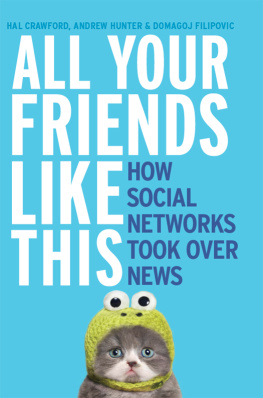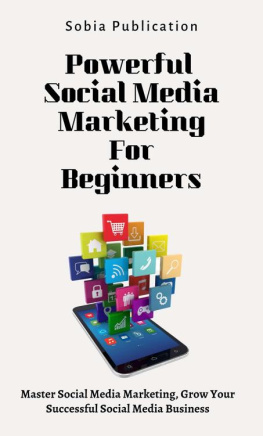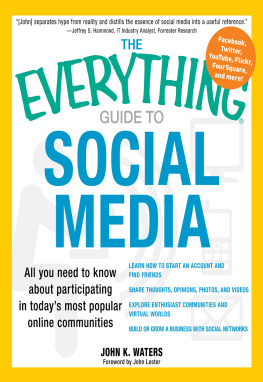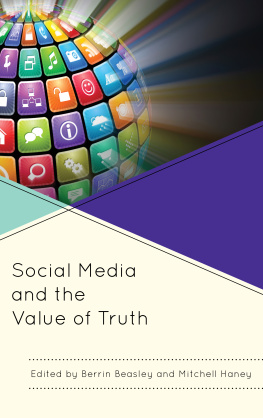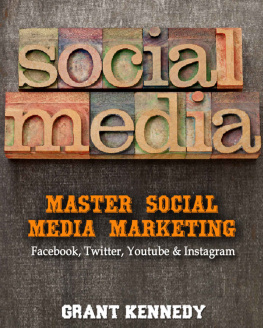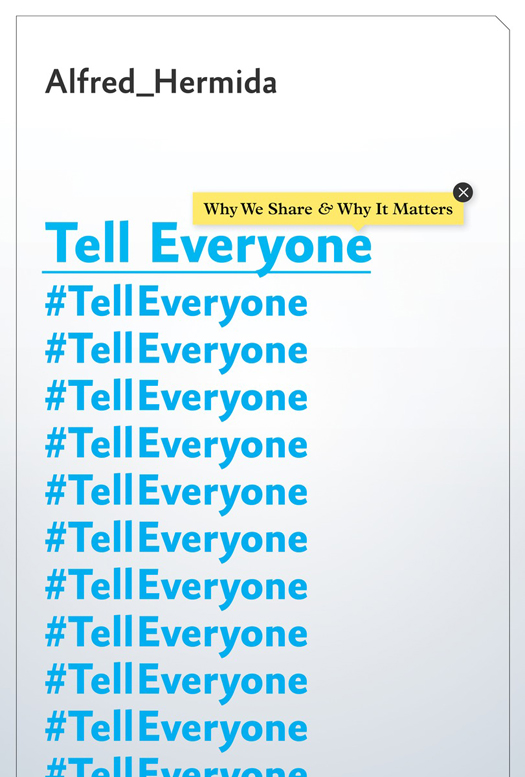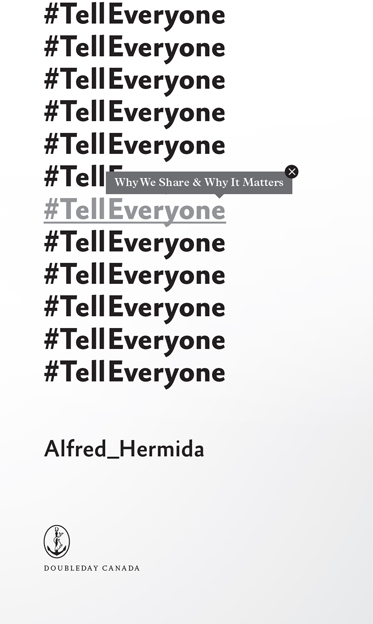Copyright 2014 Alfred Hermida
All rights reserved. The use of any part of this publication, reproduced, transmitted in any form or by any means electronic, mechanical, photocopying, recording or otherwise, or stored in a retrieval system without the prior written consent of the publisheror in the case of photocopying or other reprographic copying, license from the Canadian Copyright Licensing Agencyis an infringement of the copyright law.
Doubleday Canada and colophon are registered trademarks of Random House of Canada Limited
Library and Archives Canada Cataloguing in Publication
Hermida, Alfred, author
Tell everyone : why we share and why it matters / Alfred Hermida.
Includes bibliographical references.
ISBN 978-0-385-67956-5
eBook ISBN 978-0-385-67957-2
1. Social media. 2. Sharing. 3. Personal information management.
4. Decision making. I. Title.
HM742.H47 2014 302.231 C2012-906579-X
C2012-906882-9
Cover design: Five Seventeen
Published in Canada by Doubleday Canada, a division of Random House of Canada Limited, a Penguin Random House Company
www.randomhouse.ca
v3.1
For Rachel, the light that never goes out
Contents
T HIS IS A STORY ABOUT US . I T IS A STORY ABOUT HOW WE ARE making sense of the world at a time of remarkable change in the circulation of news, information and ideas. Our ability to share so much online, so often, so quickly with so many is rewriting the rules of the media game. Social media is transforming how we discover, learn and understand the world around us. But this is not a story about technology. People are not hooked on YouTube, Twitter or Facebook but on each other. Tools and services come and go; what is constant is our human urge to share.
Our enhanced capacity to share our experiences, emotions and opinions affects what we know and how we know it, requiring that we develop new skills to turn the rapid flow of information all around us into knowledge. Whenever I get asked to comment on how Facebook is making us lonelier or Twitter is full of falsehoods, I tend to spend the first ten minutes explaining that it isnt quite so black and white. For me, this is a dramatic illustration of the gulf between our view of social media and our understanding of it.
Every new form of communication brings with it a perennial angst about what it is doing to our brains. We are not the first to feel that everything is changing too quickly around us, and we wont be the last. Throughout history, communication technologies have been catalysts of societal and cultural change that upset the status quo. Even in ancient Greece, Socrates was wary of books, as he feared they would undermine thinking and learning.
We cant help it. We are creatures of habit. We are comfortable in the cozy embrace of the familiar. Our views of a new form of communication tend to be shaped by personal history and experience. We fall back on tried and tested approaches that worked in the past. As Marshall McLuhan said, We look at the present through a rear-view mirror. We march backwards into the future. I want us to be able to march forward into the future, equipped with the appropriate skills and expertise to make good decisions. New opportunities to create and share knowledge spark new ways of thinking and doing for those who are equipped with the skills and knowledge to take advantage of those new opportunities.
Social media is so easy to use from a technical point of view that its ease masks how radically the platform changes the way we communicate. In the space of a decade, the marketplace of ideas has been turned on its head. In the past, politicians and businesses would compete for the attention of journalists to try to get their message across to a mass audience. That audience was used to getting its news at set times of the day in neatly packaged formats, like newspapers produced by professionally trained journalists. Now politicians and businesses are reaching out directly to voters and consumers, bypassing the media. The news is a constant buzz in the background, available at any time, on any device, in just about any place, and is produced by both professionals and the audience itself.
Every generation that has lived through a period of media upheaval has faced the same issues. In the Middle Ages, it took about two hundred years for people to trust what was written on parchment over the oral recollection of witnesses. Before there was a written record of who owned property, villagers would turn to the elders to end disputes. When written records were first introduced, people treated them with suspicion. They asked some of the same questions we ask of what we read on Twitter: How do I know this document is accurate and reliable? How do I know it is not a forgery? It took a shift in mindset for communities to trust a piece of paper over the vague memory of the oldest person in the village.
The development of written records led to new ways of thinking and doing business in the Middle Ages, just as social media is doing in the twenty-first century. The marketplace of ideas is being reshaped by the volume, visibility, speed and reach of social media. It is easier to get a message out there, but also much harder to be noticed when so many are sharing so much so quickly. A hundred hours of video are uploaded to YouTube every minute, an average of 5,700 messages are sent on Twitter every second and more than a billion people are regularly sharing stories, links, photos and videos on Facebook.
For me, one of the most vivid examples of how social media has upended established ways of thinking about news and information was the Arab Spring of 2011. I felt a personal affinity with the revolutions, as I was based in Tunisia and Egypt in the early 1990s while working for BBC News. The contrast between now and then starkly illustrates how social media helps to shift power away from the state and into the hands of its citizens.
THE POWER OF KNOWLEDGE
In the 1990s, Egypt banned street protests, and any such attempts were quickly repressed. I was reporting on one such incident when I was tear-gassed by accident. Lawyers had gathered at the headquarters of the bar association in Cairo, dressed in their black gowns with white bands around their necks. Despite the ban, they planned to march peacefully to the presidential palace in protest of the suspicious deathin custodyof a fellow lawyer.
The lawyers were depending on the media to get their message out. Back then, there were no cell phones in Egypt. Internet access was restricted, as well as slow and unreliable at the best of times. Together with a handful of other journalists, I was standing behind a wall of riot shields and batons outside the compound of the bar association. For safety reasons, journalists covering protests are advised to stay behind the police to avoid being caught between the two sides.
The moment the lawyers tried to set foot outside the compound, the security forces fired tear gas. There are no YouTube videos that captured the sight of gowned lawyers coughing as they retreated into the building. So many canisters were fired that some of the tear gas started wafting back towards a row of police equipped with batons but not gas masks.


